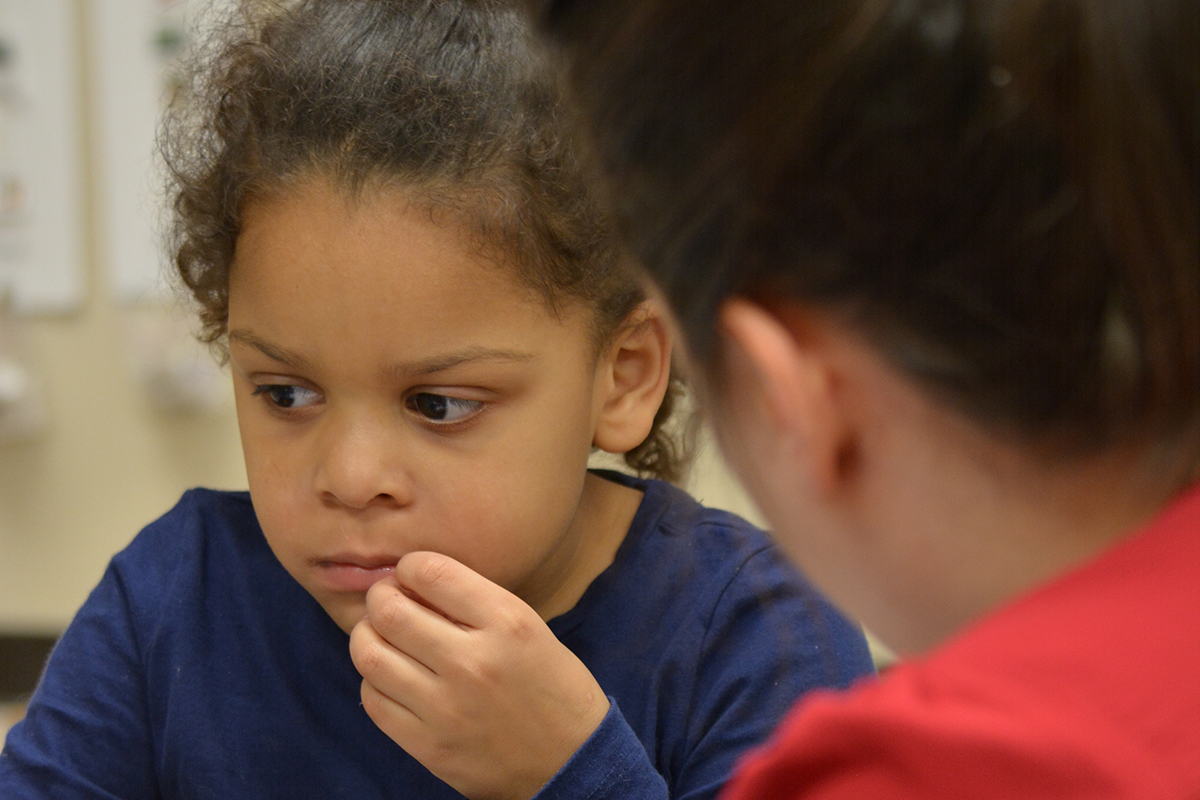Taking New Patients
Our pediatric neuropsychologist Dr. Andrea Moreau-O’Donnell specializes in working with children and adolescents with a range of neurological, medical and neurodevelopmental disorders. She is accepting new patients from families who have concerns related to their child’s learning and cognitive functioning.
Dr. Moreau-O’Donnell earned her BA degree in psychology from Lehigh University and her doctorate in clinical psychology from the Illinois School of Professional Psychology in Chicago. She completed a one-year doctoral internship at St. Vincent Indianapolis Hospital and her postdoctoral fellowship at Children’s Hospital New Orleans and St. Vincent Indianapolis Hospital. She also completed a postdoctoral masters program in Clinical Psychopharmacology. She joined the faculty at St. Vincent Hospital in 2010 and held this position until May 2018.
At Easterseals Crossroads, Dr. Moreau-O’Donnell will provide consultation and evaluation services for children, adolescents and young adults with a range of medical, neurologic and neurodevelopmental conditions. If a family needs a neuropsychological evaluation for their child, the family’s physician can send a referral directly to Easterseals Crossroads to the attention of Autism & Behavior Services and faxed to 317.466.2000. Once we receive this referral and the necessary medical information, we will make contact to schedule an initial appointment.
The evaluation is typically a multi-step process and can include the evaluation with up to three following appointments. Families are involved during the process and the results include individually-tailored recommendations. This information is used to guide medical intervention and to help inform families of individualized treatment needs. Most importantly, families will gain a better understanding of themselves and their abilities.
Dr. Moreau-O’Donnell is excited to join the dynamic team at Easterseals Crossroads as the multidisciplinary team allows for collaboration across disciplines to improve consumer care. The team is warm, inviting, encouraging and open to new ideas; she looks forward to growing the pediatric neuropsychology service line with her coworkers.
In thinking about the benefits and opportunities with this new service line, Dr. Moreau-O’Donnell is reminded of an experience from a few years back when she was evaluating a young patient due to concerns of cognitive delays and poor learning. Poor attention and difficulty following instructions were also reported. Throughout the evaluation, this young patient was cooperative, engaged and attentive, although significant lapses followed by brief disorientation were observed. The reported attention and learning difficulties did not coincide with what she observed clinically. The patient was referred for neurology and was found to have absence epilepsy. With the opportunity to follow this individual and family over time, Dr. Moreau-O’Donnell has observed that with medication and management of seizures, the patient has made incredible gains and is thriving at home and school.
The entire team feels that it is important for parents and families to know that even though the findings and diagnoses may be unexpected, the evaluation is a collaborative process that is meant to guide treatment planning, which will hopefully lead to improved quality of life, achievement of individual goals and functional gains.
Contact us for more information about neuropsychological evaluations
The Evaluation/Appointment Process
What does an evaluation involve? How long does it take?
The evaluation is typically a multi-step process. Initially, the individual and their parents/guardians are seen for an initial consultation, which typically lasts 45 to 60 minutes. During this consultation, the primary concerns and relevant history are discussed. Families will also be asked about the individual’s current and past functioning. The neuropsychologist may also request permission to talk with and/or obtain rating scales from the child’s teacher in order to have a better understanding of his/her functioning at school.
At the second appointment, the patient will work with the neuropsychologist and complete numerous measures to address referral questions and to gain a better understanding of their reasoning and thinking abilities. Most evaluations last the entire morning, and some will go into the afternoon depending on the age of the child, complexity of the referral question and needs of the patient. Children will be given breaks as needed; should the evaluation need to continue into the afternoon, the child will be given an hour break for lunch. For some children, particularly young children, it is difficult for them to maintain attention and to actively participate in the evaluation for long periods of time; testing over multiple days may be necessary. Throughout the evaluation, a parent or guardian must remain on the premises at all times.
After the evaluation has been completed, the neuropsychologist completes scoring and integrates the test data, parent/teacher rating forms and background information into a comprehensive report. If a diagnosis is rendered, it will be listed in the report along with individually tailored recommendations. At the time of the third appointment, the patient and his/her family will discuss the evaluation findings and recommendations and will also receive written copies of the child’s report. Parent and guardian questions will also be answered during this time. If appropriate, the child/adolescent will be given feedback about his/her performance at a developmentally appropriate level following the parental feedback session.
How can families benefit from the evaluation?
There are many benefits from a neuropsychological evaluation, including but not limited to
- differential diagnosis
- assessment of neurocognitive strengths and weaknesses
- monitoring of progress and effects of medical intervention
- assistance with management of various neurological and neurodevelopmental conditions
This information is used to guide medical intervention and to help inform individualized treatment needs. Most importantly, families will gain a better understanding of themselves and their abilities.
How can a family prepare for the evaluation?
The day before the appointment it is important to give a child the opportunity for full night’s rest; staying up late watching movies or playing video games is discouraged and may negatively impact the child’s energy level and ability to participate in the assessment.
Younger children can be told they are going to meet a new doctor, play thinking games and do puzzles. For older children and adolescents, explaining that they will take tests, solve puzzles and complete paper/pencil tasks is appropriate. Many children and adolescents are fearful they will be given a shot or need to undergo an uncomfortable medical procedure; please reassure them that this evaluation is more like going to school, than going to other types of doctor’s appointments.
The day of the evaluation, please make sure the child has eaten breakfast and is wearing comfortable clothing. Wearing jewelry or other garments that will serve as distractions is discouraged. Bringing snacks and drinks to consume during breaks is encouraged.




